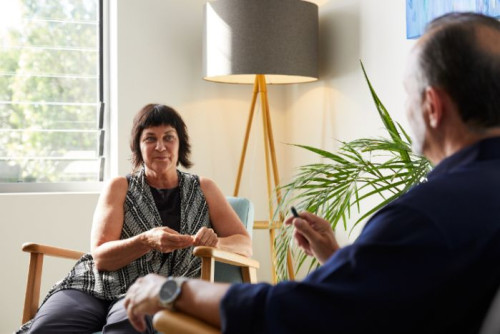








Byron Private
Verified Center
This provider's information has been quality-checked by Recovery.com's Research Team for accuracy and completeness, including center verification through appropriate third-party organizations.
Treatment Focus
This center treats substance use disorders and mental health conditions. You'll receive individualized care catered to your unique situation and diagnosis, learn practical skills for recovery, and make new connections in a restorative environment.
Primary Level of Care
Offering intensive care with 24/7 monitoring, residential treatment is typically 30 days and can cover multiple levels of care. Length can range from 14 to 90 days typically.
Treatment Focus
This center treats substance use disorders and mental health conditions. You'll receive individualized care catered to your unique situation and diagnosis, learn practical skills for recovery, and make new connections in a restorative environment.
Primary Level of Care
Offering intensive care with 24/7 monitoring, residential treatment is typically 30 days and can cover multiple levels of care. Length can range from 14 to 90 days typically.
Private Pay
You pay directly for treatment out of pocket. This approach can offer enhanced privacy and flexibility, without involving insurance. Exact costs vary based on program and length of stay. Contact the center for specific details.
Byron Private
Byron Private
About Byron Private
Experience a trusted and personalised approach to mental health and addiction treatment. Be fully supported by our expert team of medical, psychiatric, psychological and therapeutic practitioners, to make meaningful changes in your life. Set in the hinterland of Byron Bay, Byron Private is a holistic residential treatment facility providing specialised support for individuals suffering from mental health, addictions, PTSD, trauma and eating disorders. With a maximum of 12 guests at a time, they ensure an attentive experience for each individual.
Personalised Care
Byron Private takes a caring and personalized approach to support individuals in addressing the underlying drivers of mental health issues such as anxiety, depression, alcohol and drug addiction, burnout, PTSD and trauma, gambling addiction, eating disorders, relationship breakdown, and sex and love addiction.
The Program
Byron Private is designed to be non-clinical, with only a small number of residents at any one time. Their residential program reflects a holistic approach, offering comprehensive medical and therapeutic care alongside a wellbeing program that emphasizes nutrition, exercise, meditation, and bodywork.
The Setting
Located just ten minutes from Byron Bay’s pristine beaches, Byron Private's purpose-built center is nestled within the hills of the Byron hinterland. The atmosphere is welcoming and intimate, where individuals are treated with respect, consideration, and care. The healing environment, combined with a dedicated team, ensures an unparalleled experience.
Sustainable And Luxurious Living
Byron Private continually looks for ways to reduce their environmental impact. They collect rain and groundwater, keeping it free from chlorine or fluoride. Food waste, paper, and cardboard are all composted and used for organic food production. Koalas also come to enjoy the many trees on Byron Private's property. Inside their gorgeous home, patients will enjoy spacious private rooms, well-decorated common areas, gourmet organic meals, and a wrap-around porch perfect for relaxing. Byron Private’s compassionate team is there to help every individual through their journey through recovery. Byron Private is a private pay residential program.
Byron Private is a proud member of Sana Health Group, a network of mental health and addiction treatment centres committed to patient excellence. As part of our commitment to providing the highest quality care, Byron Private and other Sana Health Group facilities adhere to rigorous national accreditation standards set by the Australian Government's National Safety and Quality Health Service (NSQHS). This accreditation is a requirement of all public and private hospitals country-wide, and our initiative to obtain it demonstrates our dedication to evidence-based practices, clinical governance, and continuous improvement, ensuring exceptional patient outcomes.

Highlights from the Center
Highlights
These highlights are provided by and paid for by the center.
1-on-1 Counseling
Therapeutic Location
Customized Treatment Plans
Medically Assisted Detox
Center Overview
Treatment Focus
This center treats substance use disorders and mental health conditions. You'll receive individualized care catered to your unique situation and diagnosis, learn practical skills for recovery, and make new connections in a restorative environment.

Byron Private
Pricing and Program Length
Estimated Center Costs
The cost listed here (from $44,800 AUD per 4 weeks), is an estimate of program cost. Center price can vary based on program and length of stay. Contact the center for more information. Recovery.com strives for price transparency so you can make an informed decision.




Our Network of Partner Facilities
Recovery.com Verified Listing
Recovery.com verified that the name, location, contact information and license to operate for this treatment provider are valid and up-to-date.

Accredited by HDAA

Licensed

NSQHS Standards
Recovery.com is an independent, third-party mental health resource. Verification does not imply endorsement and does not guarantee the quality of treatment services.
Meet Your Care Team

Dr. Tessa Cookson
Clinical Director / Psychiatrist
B.Medicine M. BEth FRANZCP

Dr. Anthony Solomon
General Practitioner
MBBS, FRACGP, FARGP

Kylie Beattie
Managing Director
Bachelor of Social Science (Counselling)

Luke Mahon
Clinical Lead
MA Gest

Kim Meighan
Clinical Care Coordinator
RN

Ilke Sharratt
Business Operations Lead

Anne Lambert
Family Therapist / Primary Therapist
Ba S&Hc

Lisa Toman
Psychotherapist / Equine
MaGest

Jim Donald
Lead Care Staff

Kristyn Dobson
Naturopath
Bachelor of Naturopathy

Benny Green
Primary Therapist / Social Worker
BA SoSC

Shane Sutton
Primary Therapist / Psychologist
PGDip Psych
Your Care Options
Specializations
Alcohol
Using alcohol as a coping mechanism, or drinking excessively throughout the week, signals an alcohol use disorder.
Anxiety
Anxiety is a common mental health condition that can include excessive worry, panic attacks, physical tension, and increased blood pressure.
Bipolar
This mental health condition is characterized by extreme mood swings between depression, mania, and remission.
Co-Occurring Disorders
A person with multiple mental health diagnoses, such as addiction and depression, has co-occurring disorders also called dual diagnosis.
Depression
Symptoms of depression may include fatigue, a sense of numbness, and loss of interest in activities. This condition can range from mild to severe.
Drug Addiction
Drug addiction is the excessive and repetitive use of substances, despite harmful consequences to a person's life, health, and relationships.
Eating Disorders
An eating disorder is a long-term pattern of unhealthy behavior relating to food. Most people with eating disorders have a distorted self-image.
Trauma
Some traumatic events are so disturbing that they cause long-term mental health problems. Those ongoing issues can also be referred to as "trauma."
Who We Treat
Co-Occurring Disorders
A person with multiple mental health diagnoses, such as addiction and depression, has co-occurring disorders also called dual diagnosis.
Executives
Executive treatment programs typically directly support the needs of people who manage businesses and may provide flexible schedules and office space to allow work during treatment.
Young Adults
Emerging adults ages 18-25 receive treatment catered to the unique challenges of early adulthood, like college, risky behaviors, and vocational struggles.
LGBTQ+
Addiction and mental illnesses in the LGBTQ+ community must be treated with an affirming, safe, and relevant approach, which many centers provide.
Midlife Adults
For adults ages 40+, treatment shifts to focus on the unique challenges, blocks, and risk factors of their age group, and unites peers in a similar community.
Mild Disabilities
Adults with mild physical or intellectual disabilities receive treatment catered to their specific needs in a safe and clinically supportive environment.
Professionals
Busy, high-ranking professionals get the personalized treatment they need with greater accommodations for work, privacy, and outside communication.
Treatment Services
Detox
Detox fully and safely removes toxic substances from the body, allowing the next steps in treatment to begin with a clean slate.
Residential
In a residential rehab program, patients live onsite, with access to daily treatment and 24-hour care. An average stay is 30-90 days.
Approaches
Evidence-Based
A combination of scientifically rooted therapies and treatments make up evidence-based care, defined by their measured and proven results.
Holistic
A non-medicinal, wellness-focused approach that aims to align the mind, body, and spirit for deep and lasting healing.
Personalized Treatment
The specific needs, histories, and conditions of individual patients receive personalized, highly relevant care throughout their recovery journey.
Twelve Step
Incorporating spirituality, community, and responsibility, 12-Step philosophies prioritize the guidance of a Higher Power and a continuation of 12-Step practices.
Wellness
Wellness philosophies focus on the physical, mental, and spiritual wellness of each patient, helping them restore purpose with natural remedies.
Therapies
1-on-1 Counseling
Patient and therapist meet 1-on-1 to work through difficult emotions and behavioral challenges in a personal, private setting.
Meditation & Mindfulness
A practiced state of mind that brings patients to the present. It allows them to become fully aware of themselves, their feelings, and the present moment.
Mindfulness Therapy
This ancient practice can be mental, emotional, and even spiritual. In meditation, you focus your attention on the present moment without judgement.
Art Therapy
Visual art invites patients to examine the emotions within their work, focusing on the process of creativity and its gentle therapeutic power.
Dance Therapy
This experiential therapy uses dance to improve body awareness, physical health, and social skills.
Equine Therapy
Guided interactions with trained horses, their handler, and a therapist can help patients improve their self-esteem, trust, empathy, and social skills.
Experiential Therapy
With this approach, patients heal by doing. Therapists help patients process difficult emotions to speak, using guided activities like art or dance.
Eye Movement Therapy (EMDR)
Lateral, guided eye movements help reduce the emotional reactions of retelling and reprocessing trauma, allowing intense feelings to dissipate.
Conditions We Treat
Pornography Addiction
A person with a porn addiction is emotionally dependent on pornography to the point that it interferes with their daily life and relationships.
ADHD, ADD
ADHD is a common mental health condition caused by dopamine imbalance. Common symptoms include inattention, hyperactivitiy, and impulsivity.
Anger
Although anger itself isn't a disorder, it can get out of hand. If this feeling interferes with your relationships and daily functioning, treatment can help.
Anxiety
Anxiety is a common mental health condition that can include excessive worry, panic attacks, physical tension, and increased blood pressure.
Bipolar
This mental health condition is characterized by extreme mood swings between depression, mania, and remission.
Burnout
Burnout entails mental and physical exhaustion, and leads to a severe lack of fulfillment. This condition is often caused by overwork.
Chronic Pain Management
Long-term physical pain can have an affect on mental health. Without support, it can also impact your daily life and even lead to addiction.
Codependency
Codependency is a pattern of emotional dependence and controlling behavior. It's most common among people with addicted loved ones.
Depression
Symptoms of depression may include fatigue, a sense of numbness, and loss of interest in activities. This condition can range from mild to severe.
Substances We Treat
Alcohol
Using alcohol as a coping mechanism, or drinking excessively throughout the week, signals an alcohol use disorder.
Benzodiazepines
Benzodiazepines are prescribed to treat anxiety and sleep issues. They are highly habit forming, and their abuse can cause mood changes and poor judgement.
Co-Occurring Disorders
A person with multiple mental health diagnoses, such as addiction and depression, has co-occurring disorders also called dual diagnosis.
Cocaine
Cocaine is a stimulant with euphoric effects. Agitation, muscle ticks, psychosis, and heart issues are common symptoms of cocaine abuse.
Drug Addiction
Drug addiction is the excessive and repetitive use of substances, despite harmful consequences to a person's life, health, and relationships.
Ecstasy
Ecstasy is a stimulant that causes intense euphoria and heightened awareness. Abuse of this drug can trigger depression, insomnia, and memory problems.
Heroin
Heroin is a highly addictive and illegal opioid. It can cause insomnia, collapsed veins, heart issues, and additional mental health issues.
Psychedelics
Hallucinogenic drugs—like LSD—cause euphoria and increased sensory experiences. When abused, they can lead to depression and psychosis.
Languages
Aftercare
Care Designed for Your Needs
Personal Amenities
Amenities
Special Considerations
Activities
Yoga
Yoga is both a physical and spiritual practice. It includes a flow of movement, breathing techniques, and meditation.
Off-Site Activities
Off-Site Amenities

Learn More About the Center
Who Is Rehab For?
Byron Private discusses who rehab is for, in full belief treatment is for all.
Take a Photo Tour
See more pictures of Byron Private, including their property and amenities.
A Typical Day in Treatment
Learn more about what to expect during a typical day at Byron Private.
Sustainability at Byron Private
Byron Private commits to sustainability–see how.
What people are saying
Treatment
4.9
Accommodations
4.6
Food & Nutrition
5.0
Value
4.8
Pros
- Treated With Respect (7)
- Personalized (7)
- Gourmet & Nutritious Food (7)
- Friendly & Competent Staff (7)
Jo
Treatment in 2024 • (30 days) • Reviewed 06/02/24
Former Client
•High School Teacher
•Sydney
Byron Private
Dale
Treatment in 2023 • (90 days) • Reviewed 06/06/25
Former Client
•Veteran
•Victoria
SM
Treatment in 2025 • (30 days) • Reviewed 02/18/25
Former Client
•Tech
•Sydney
Byron Private
Jake
Treatment in 2015 • (90 days) • Reviewed 11/28/22
Former Client
•Chief Remote Pilot
•Byron Bay
Byron Private
Louie Thomas
Treatment in 2022 • (30 days) • Reviewed 01/08/23
Former Client
•Sales and brand management
•NSW
Byron Private





